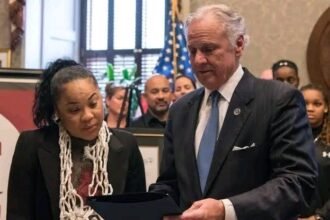**Unprecedented Rejection: Dallas Mavericks’ Kyrie Irving Rejects a Massive $60.5 Million Offer from Golden State Warriors, Prioritizing Team Loyalty Over Financial Gain**
In an era where professional athletes frequently chase the highest paycheck, Dallas Mavericks’ star point guard Kyrie Irving has made a stunning decision that defies conventional wisdom. Reports confirm that Irving rejected a massive $60.5 million offer from the Golden State Warriors, choosing instead to remain with the Mavericks. This move has sent shockwaves through the NBA, sparking debates about loyalty, legacy, and the evolving priorities of modern athletes. Irving’s decision is not just about basketball—it’s a statement about commitment, team chemistry, and the intangible value of belonging to a franchise that aligns with his personal and professional aspirations.
The Golden State Warriors, a franchise known for its championship pedigree and financial flexibility, presented Irving with a lucrative deal that would have placed him among the league’s highest-paid players. Partnering with Stephen Curry, Klay Thompson, and Draymond Green would have instantly made the Warriors title favorites, offering Irving a chance to add another ring to his resume. Yet, despite the obvious financial and competitive benefits, Irving turned it down. His choice underscores a growing trend among elite players who prioritize fit, culture, and long-term vision over immediate financial windfalls.
For Irving, loyalty to the Mavericks appears to be a driving factor. Since joining Dallas in 2023, he has developed a strong on-court rapport with Luka Dončić, forming one of the most dynamic backcourts in the league. The Mavericks have built their system around his strengths, allowing him to thrive as both a scorer and playmaker. Additionally, the organization has supported him through various challenges, including injuries and off-court controversies. This mutual trust seems to have fostered a sense of belonging that money alone couldn’t replace.
Beyond loyalty, Irving’s decision may also reflect his desire for legacy over short-term gains. While the Warriors offer a proven championship blueprint, staying in Dallas allows Irving to cement his status as a franchise cornerstone. Leading the Mavericks to a title would carry a different weight than joining an already-established dynasty. Irving has always been a player who values narrative—his 2016 championship with Cleveland, where he hit the iconic game-winning shot against the Warriors, remains a defining moment of his career. By staying in Dallas, he has the opportunity to author another legendary chapter on his own terms.
Financial security, of course, is rarely a concern for athletes of Irving’s caliber. Even without the Warriors’ offer, he remains one of the highest-earning players in the league, with endorsement deals and previous contracts ensuring generational wealth. For him, the difference between $50 million and $60 million may be negligible compared to the satisfaction of playing in an environment where he feels valued and empowered. This mindset challenges the traditional belief that athletes should always chase the highest bidder, suggesting that personal fulfillment and team success can outweigh pure financial incentives.
The ripple effects of Irving’s decision extend beyond his own career. It sends a message to younger players about the importance of fit and happiness over sheer contract numbers. In recent years, stars like Damian Lillard and Bradley Beal have also chosen long-term commitments to their teams despite opportunities elsewhere, signaling a shift in player priorities. The NBA’s culture is evolving, with more athletes considering factors like organizational stability, coaching philosophy, and city lifestyle when making career decisions.
For the Mavericks, retaining Irving is a monumental victory. Losing him to a rival like the Warriors would have been a devastating blow, both competitively and psychologically. Instead, Dallas can continue building around its star duo, knowing that Irving is fully invested in the team’s future. This stability is crucial as they aim to contend in a loaded Western Conference. With the right roster adjustments, the Mavericks could soon return to championship contention, with Irving playing a pivotal role in that journey.
Meanwhile, the Warriors must regroup. Missing out on Irving means they’ll need to explore other options to bolster their roster around their aging core. While they remain a formidable team, the addition of Irving would have given them a significant boost in their quest to reclaim dominance. His rejection forces them to reconsider their strategy, whether through trades, free agency, or internal development.
Ultimately, Kyrie Irving’s rejection of $60.5 million is more than just a headline—it’s a reflection of changing values in professional sports. In an age where player movement is constant and superteams dominate, his choice to stay with the Mavericks is a rare display of loyalty. Whether motivated by personal relationships, legacy aspirations, or sheer comfort, Irving has made it clear that some things are worth more than money. As the NBA landscape continues to shift, his decision may inspire others to weigh their careers not just in dollars, but in fulfillment, impact, and the chance to leave a lasting mark on a franchise.
For now, Dallas celebrates. The Warriors recalibrate. And Kyrie Irving proves once again that his path is uniquely his own.





